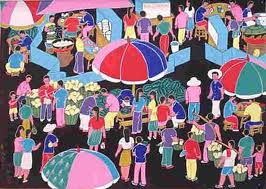From a sermon given Summer Solstice Service 2002:
Today’s program is the second in our series this year focusing on the concept of peace. My sermon this morning is about the Golden Rule.
The Golden Rule, of course, is the name that has been given to a very pivotal teaching in Christianity—the concept of doing onto others as you would have them do to you.
This concept is not unique to Christian-based religions. We know that it comes from spirit because it is a truth that flows through most, if not all religious traditions and faiths. I’ve collected a few versions of this same teaching from various religions to show you the universal nature of the Golden Rule. I’d like to read these for you now.
Hurt Not Others With That Which Pains Yourself. (Buddhism).
Treat Others As you Would Yourself Be Treated. (Hinduism)
What You Yourself Hate, Do to No Man (Judaism)
Live in Harmony, For We Are All Related (Native American)
Do Unto All Man As You Would Wish To Have Done Unto You (Islam)
One Word Sums Up the Basis of All Good Conduct: Loving Kindness. Do Not Do to Others What You Would Not Want Done to Yourself (Confucianism)
As you can see, even the words are similar to the ones with which most of us are familiar, i.e. the words of Jesus of Nazareth. This version is from Matthew, Chapter 7, Verse 12:
Whatever you wish men to do for you, do likewise also for them; for this is the law and the prophets.
Parenthetically, I think it is interesting that we have intuitively labeled this concept the Golden Rule. If you think of it, very few of Jesus’s other teachings or sayings ended up acquiring a label. And why this one? Most people have very little awareness of the significance of this particular label. What I believe is that one of the Christ’s greatest gifts to us was that he channeled to the Earth for the first time, a particularly high, miraculously healing vibration of energy, a vibration which when seen on a clairvoyant level appears golden in color. I think the label itself tells us that the energy around the Golden Rule truly is something that if we accept it, transforms us, transforms our very bodies, our very souls, bringing us to a higher place.
Although the words that Jesus used in the Golden Rule were traditional and familiar to people around the world during and subsequent to his lifetime, the energy behind them was new. I believe that he did bring this spiritual truth to a new level. In fact, his message was radical, even revolutionary. And like many of the Christ’s teachings, 2000 years later we still struggle to have some genuine understanding of that to which he was referring with his simple words. Spiritually based words are like that: straight-forward but so profound as to be endless in consequence and meaning. To understand those words better, I would like to go back and tell you more about the historical context of them, particularly that part of the historical context that has been forgotten by those of us currently incarnated in twenty-first century United States.
Jesus was a Jew. He was part of a society, a culture, a people who traditionally held lively, sometimes fierce debates among its members about all aspects of their religion. There were several prominent sects of the Jewish people at that time and they were quite divergent in their beliefs. The people tended to be very passionate about their belief system. Arguing about differing ideology was the norm. It was not uncommon for Jewish men to die for their beliefs, even though any particular Jewish man might hold ideas that were fundamentally different from another particular Jew within the same sect. Nonetheless, most Jews came together as a people during holy times and worshiped in the same temple.
In modern America, we don’t really have an equivalent experience. We might theoretically acknowledge, for example, that a Jehovah’s Witness, a Catholic, a Southern Baptist, a Seventh Day Adventist, and a Pentecostal are all Christians, but we would never come together at one worship service in the same church or temple at the end of the day. When it comes to religion, our tradition is to go our separate ways and pretend the people with whom we don’t agree don’t exist unless we are badmouthing them in private company.
Jesus had the challenge of trying to reach all these conflicted, often argumentative, sometimes openly hostile people, Jews and non Jews alike, during the same public talks with his messages about love, peace, and the essential nature of God. He tried to find words that would help his listeners transcend their surface differences and enter the world of spirit, where all is unconditionally accepted. And he tried to do this with crowds who were often full of individuals quite determined to trying to pull him into fragmenting debates about religious dogma.
He was confronted for example by the Sadducees, who were a prominent Jewish sect that tended to approach sacred Jewish writings concretely and interpret them literally, in a similar fashion to how fundamentalist Christians often approach the Christian Bible in today’s times. The challenge for Jesus, then, was to find ways to talk about traditional Jewish teachings that illuminated the spirit behind them without alienating people who, in their ignorance, wanted to impose their limited understanding of the words onto others in the form of rules.
Out of this dilemma came the teaching that we know as the Golden Rule. This rule states that there are no rules as important as the mandate to love fully and unconditionally. Let me read you the passage that I think best illustrate the master’s teachings in this regard. It is from Mark, Chapter 12, Verses 30 and 31. In this scripture, a man described in the Bible only as a “scribe” overhears Jesus during one of his public debates and thinks Jesus is giving good answers. As a result, the man decides to ask Jesus a tricky question about Jewish law. Of all the topics about which the Jews debated with each other, arguments about the extensive and frequently contradictory Jewish law often generated the most heat, the most calls for absolute adherence to whichever position the speaker upheld. Jesus responded unequivocally with the following directive, a position that paradoxically is both absolute and flexible–read non-rule-bound–at the same time.
You must love the Lord your God with all your heart and mind and with all your might; this is the first commandment.
And the second is like to it. You must love your neighbor as yourself.
There is no other commandment greater than these.
What I hear Jesus saying is that the only thing that really matters is that each of us commit ourselves totally, that is commit all of our energy or what is referred to in this passage as our “might,” to God. We are enjoined to make that commitment with the use of heart and mind. In the words that we use around here in this church, we are advised to commit to the indwelling personal divine, the God of our Heart.
Further, Jesus tells each of us to commit ourselves totally to the unconditional acceptance and love of all around us. Not just the nice people or the people who do things for us, or the people we know, but all those geographically near to us, i.e. all of those with whom we come in contact. And he slips in a great Truth. He articulates that loving the other folks in our world is pretty much the same thing as loving God.
Please notice the subtle underlying progression in his words. I believe the movement of the sentence supports the idea that learning to love God completely leads to learning to love oneself as a child or aspect of God which in turn leads to loving other children/aspects of God. But Jesus seems to say that sometimes you have to consciously commit to loving others. You can’t just wait until you’ve got it straight with God; and only then get around to taking on the task of improving your relationship to your fellow human being. Even though ultimately, loving others is the natural progression of learning to love God, for most of us it takes a conscious choice, an act of willpower, to love some individuals in our world. It can be hard work.
If we do these two things—follow the God of our Heart unfailingly, and love others unconditionally–everything else will fall into place.
During this period of strife in the world-at-large, let us take heed of the teaching of the master. I urge you to use every opportunity to find the God within, both in and out of your meditations. Translate the love that will naturally grow over time from alignment with our Creator to your thoughts, words, and actions towards the people in the world now, irrespective of whether or not they “deserve” it. Don’t wait to love people until it is the easy next step in your development. Do it now. Choose unconditional acceptance and care for the well-being of others, even the people that mistreat or abuse you. The rest will take care of itself.
Copyright 2002 by Rev. Resa Eileen Raven







You must be logged in to post a comment.